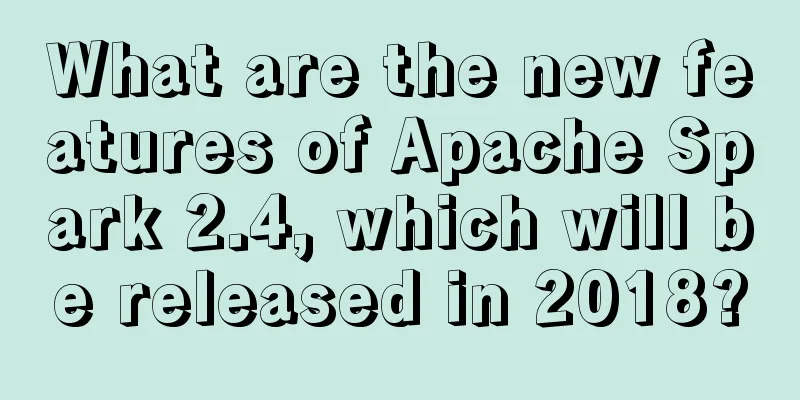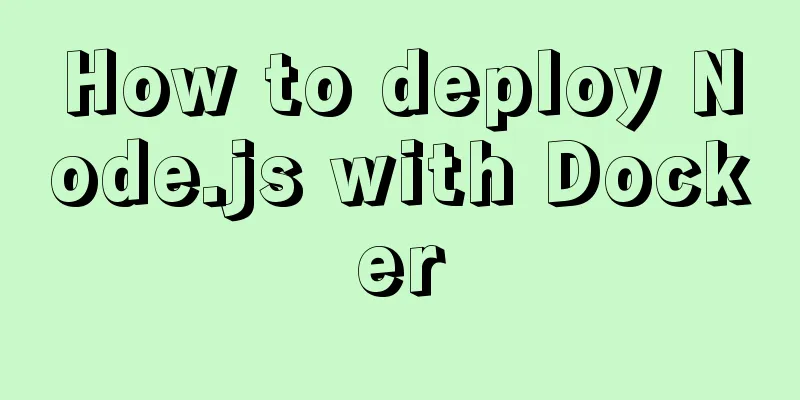How to build php7 with docker custom image

|
First, perform a simple Docker installation. To customize the image, we need to select a base image to build our own image: in fact, to put it bluntly, it is to execute the commands to install various programs in a container with a basic definition to generate the so-called Dockerfile file. In this case, the first step is to find a local image as the base image to operate: 1
2 In the second step, we need to build a directory to store the Dockerfile file
Create a docker_demo directory under root to store the Dockerfile file and the program files that need to be installed. Because I want to build a custom PHP environment, let's make a PHP7 compressed package. wget http://am1.php.net/get/php-7.0.0.tar.gz/from/this/mirror
Then change the name
Now we have both PHP and nginx. As for COMPOSER, you can operate it yourself after PHP is successfully installed~~~ The next step is to write the Dockerfile file. Before that, let’s take a brief look at the keyword format of Dockerfile: FROM represents which image is based on RUN installation software use MAINTAINER The creator of the image CMD is the command executed when the container starts. However, there can only be one CMD command in a Dockerfile. If there are multiple CMD commands, only the last one will be executed. ENTRYPOINT The command executed when the container starts. However, there can only be one CMD command in a Dockerfile. If there are multiple commands, only the last one will be executed. USER The user that runs the container EXPOSE The port exposed by the service inside the container. The host also needs to do port mapping when running the container: docker run -d -p 80:8080 centos6xxx The above command maps port 8080 inside the container to port 80 on the host. ENV is used to set environment variables ADD copies files on the host to the corresponding path in the container. All files and folders copied to the container have permissions of 0755, and uid and gid are 0. If the file is in a recognizable compressed format, docker will help decompress it. ADD is only run once when building the image, and will not be reloaded when running the container later. Examples include: ADD nginx-1.12.2.tar.gz /usr/local/src VOLUME can mount local folders or folders of other containers into the container. WORKDIR Switch directory to use (equivalent to cd directory) The commands specified by ONBUILD are not executed when building the image, but are executed in its sub-images. After learning the basic Dockerfile commands, let's try to build this environment. docker pull centos First download a base image. If you have this step, please ignore it. Here is my Dockerfile # base image # Base image FROM docker.io/centos # MAINTAINERWritten by MAINTAINER [email protected] # put nginx-1.12.2.tar.gz into /usr/local/src and unpack nginx Come on, put both nginx and PHP into the /usr/local/src directory of the base image in advance to facilitate compilation and installation ADD nginx-1.12.2.tar.gz /usr/local/src ADD php-7.0.0.tar.gz /usr/local/src # running required command Install a series of messy dependency packages of Nginx RUN yum install -y gcc gcc-c++ glibc make autoconf openssl openssl-devel RUN yum install -y libxslt-devel -y gd gd-devel GeoIP GeoIP-devel pcre pcre-devel RUN useradd -M -s /sbin/nologin nginx # change dir to /usr/local/src/nginx-1.12.2 WORKDIR /usr/local/src/nginx-1.12.2 # execute command to compile nginx RUN ./configure --user=nginx --group=nginx --prefix=/usr/local/nginx --with-file-aio --with-http_ssl_module --with-http_realip_module --with-http_addition_module --with-http_xslt_module --with-http_image_filter_module --with-http_geoip_module --with-http_sub_module --with-http_dav_module --with-http_flv_module --with-http_mp4_module --with-http_gunzip_module --with-http_gzip_static_module --with-http_auth_request_module --with-http_random_index_module --with-http_secure_link_module --with-http_degradation_module --with-http_stub_status_module && make && make install #Install a local Mysql first RUN yum install -y wget RUN wget http://repo.mysql.com/mysql57-community-release-el7-8.noarch.rpm RUN rpm -ivh mysql57-community-release-el7-8.noarch.rpm RUN yum install -y mysql-server #At this point, start installing PHP. As usual, start installing some compiled dependency packages. RUN yum -y install epel-release RUN yum -y install libmcrypt-devel RUN yum -y install libxml2 libxml2-devel openssl openssl-devel curl-devel libjpeg-devel libpng-devel freetype-devel WORKDIR /usr/local/src/php-7.0.0 #编译安装RUN ./configure --prefix=/usr/local/php7 --with-config-file-path=/usr/local/php7/etc --with-config-file-scan-dir=/usr/local/php7/etc/php.d --with-mcrypt=/usr/include --enable-mysqlnd --with-mysqli --with-pdo-mysql --enable-fpm --with-fpm-user=nginx --with-fpm-group=nginx --with-gd --with-iconv --with-zlib --enable-xml --enable-shmop --enable-sysvsem --enable-inline-optimization --enable-mbregex --enable-mbstring --enable-ftp --enable-gd-native-ttf --with-openssl --enable-pcntl --enable-sockets --with-xmlrpc --enable-zip --enable-soap --without-pear --with-gettext --enable-session --with-curl --with-jpeg-dir --with-freetype-dir --enable-opcache && make && make install RUN cp php.ini-production /usr/local/php7/etc/php.ini After successfully building the Dockerfile file, docker build is used to build it. docker build -t centos_lnmp:v1 . The trailing . represents the relative path to the current directory. You can also use an absolute path. Then there is the long wait
Until the image is successfully built, we start again docker images
We see that the image has been built successfully (there is a slight chance that the build will fail, in which case just delete the container and the image and rebuild it), then run docker run -dt -p 80:80 centos_lnmp:v1
After success, you can enter the container and configure nginx php. The above is the full content of this article. I hope it will be helpful for everyone’s study. I also hope that everyone will support 123WORDPRESS.COM. You may also be interested in:
|
<<: js data types and their judgment method examples
>>: MySql batch insert optimization Sql execution efficiency example detailed explanation
Recommend
Detailed explanation of Vue.js directive custom instructions
Customize a demo command The syntax of Vue custom...
A brief summary of my experience in writing HTML pages
It has been three or four months since I joined Wo...
Summary of Common Letters in Unicode
Most of the earliest computers could only use ASC...
Docker adds a bridge and sets the IP address range
I don't know if it's because the binary d...
Two ways to exit bash in docker container under Linux
If you want to exit bash, there are two options: ...
How to add Lua module to Nginx
Install lua wget http://luajit.org/download/LuaJI...
Detailed explanation of the use and differences of various lock mechanisms in Linux
Preface: I believe that those who need to underst...
Nginx handles http request implementation process analysis
Nginx first decides which server{} block in the c...
MySQL series: redo log, undo log and binlog detailed explanation
Implementation of transactions The redo log ensur...
JS implements the snake game
Table of contents 1. Initialization structure 2. ...
A practical record of checking and processing duplicate MySQL records on site
Table of contents Preface analyze Data Total Repe...
Detailed installation process of mysql5.7.21 under win10
This article shares the installation of MySQL 5.7...
202 Free High Quality XHTML Templates (1)
Here 123WORDPRESS.COM presents the first part of ...
Docker deploys mysql to achieve remote connection sample code
1.docker search mysql查看mysql版本 2. docker pull mys...
Detailed explanation of common operations of Docker images and containers
Image Accelerator Sometimes it is difficult to pu...
















